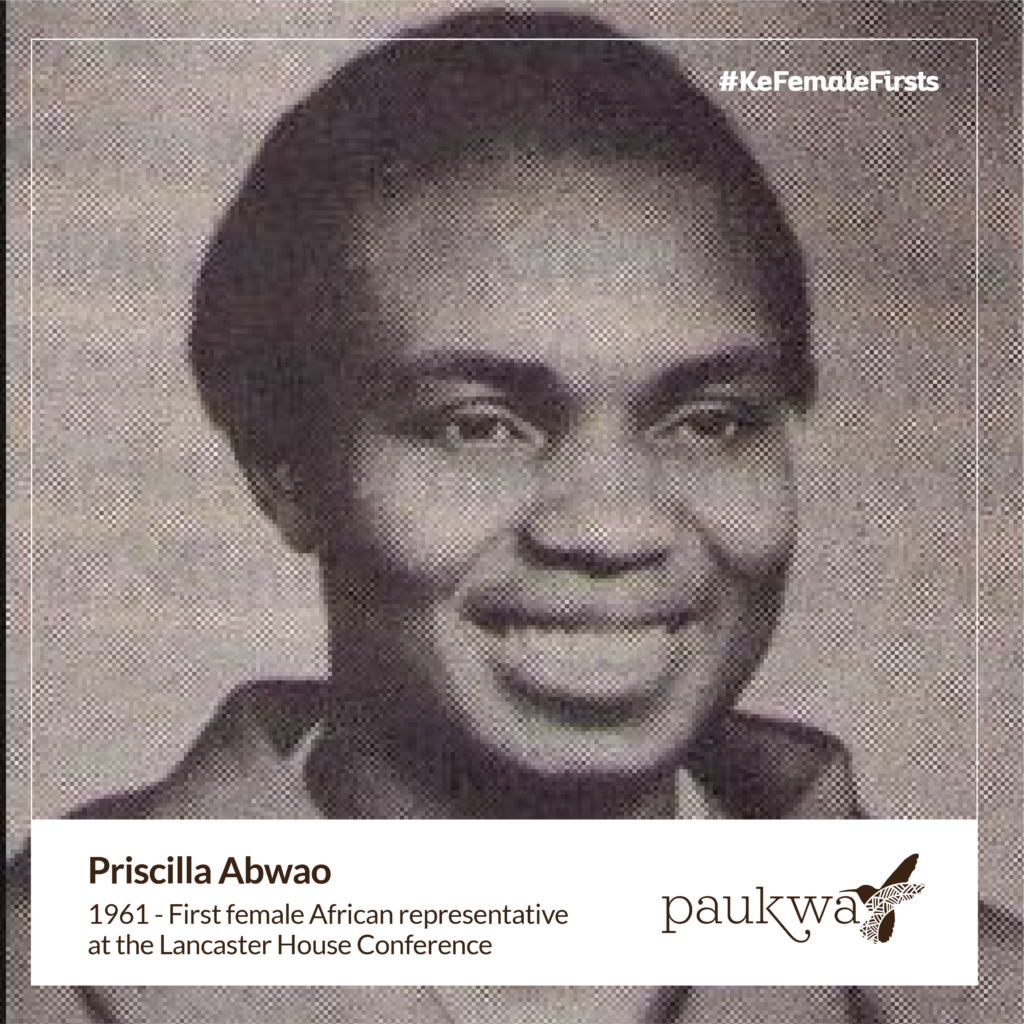Priscilla Abwao: The Legislative Council Delegate
When Kenyans from various communities united in the mid 1900s to fight for our independence on the legislative front, participation in political leadership was highly skewed towards patriarchal governance. This was a perpetuation of the forms of rulership that existed in most communities before colonialism. Enabling this school of thought was the fact that in order to participate in party politics, a formal education was necessary, but investment in African girls’ education was not deemed as ‘important’. These two factors made the probability of a woman’s chance at occupying a governance position very low. Amid all these setbacks, Priscilla Ingasiani Abwao navigated her way through to create a lasting change in the political sphere.
Early Life, Education
Upon completing her primary education at Friends’ Girls’ Boarding School in Kaimosi, Priscilla received admission to Nabumali High School in neighbouring Uganda. She was then enrolled into Women’s Training Centre in Kabete, initially known as Jeanes School, to train as a teacher. Reaching this level of education was a remarkable feat for an African girl born in 1923, but Priscilla was determined to break even more barriers of her time. Armed with her education, she returned to her alma mater in Kaimosi to mould young minds.
Career and Pursuits
In 1951, after two years of teaching, Priscilla was ready for a new challenge in her budding career. Being an educator had opened an avenue for her to consider ways in which she could do more for her community. She applied for a government job as a social worker and upon confirmation, was deployed to North Nyanza. Her community development work continued until 1955 when she received a scholarship to Radbrook College to pursue a diploma in Domestic Science. After a one-year stint in Britain, she returned and took up a new job as a Community Development Officer. As Priscilla was marking these milestones in her life, the nation was also undergoing radical changes that would soon demand her professional attention.
With constitutional reforms taking place, the Legislative Council had been formed and Kenyans were using this platform to agitate for their independence. Several small wins came about with the drafting of the Lyttleton Constitution of 1954 as well as the Lennox-Boyd Constitution of 1958, but they were not enough. This led to the convening of the Lancaster House Conference during which the constitutional and independence frameworks were to be negotiated.
Nomination and The Conference
After the first conference in 1960, the government was in search of a woman who would be one of the ten African delegates. On 10th May 1961, Priscilla was nominated as the sole female African representative, and she was prepared to make a change.
The Lancaster House Conference was meant to be a space on which Priscilla could represent the needs of African women as the nation inched towards Jamhuri season. But this was not to be. Her inclusion in this delegation was out of mere tokenism and she was not allowed to speak or engage in the discussions being held. As eager as she was to use her voice, she was silenced and relegated to the shadows of the conversations because of her gender. She was, however, allowed to present a written memorandum during the 1962 conference. Never one to waste an opportunity, no matter how small, Priscilla decided to speak through pen and paper.
A Woman to Remember
In the Memorandum on Behalf of African Women to the Kenyan Constitution, Priscilla underscored the importance of giving women equal representation in an independent Kenya. She detailed the importance of educating both genders. With regards to race, she touched on the importance of respect and argued that the Swahili word, memsahib, used in deference to European women should be extended to African women as well. According to Priscilla, women had earned the right to be treated as partners in the new society they had helped create, and so issues touching on them directly needed to be prioritized post-independence.
This memorandum was like a pebble cast into deep unwelcoming waters. Most of her suggestions were not taken into consideration as the constitution was drafted. Having delivered her message, Priscilla resigned from the council on 15th June 1962 to immerse herself back into social work. In subsequent years, this pebble caused a huge ripple effect as Priscilla’s work and words paved the way for other women to join the political and advocacy arena. It began a conversation about the role of women in an independent society, one that has not ceased even after her passing on 13th November 2009.
For creating this ripple effect and questioning not only racial disparities but the pre-existing gender imbalance, we celebrate Priscilla Ingasiani Abwao, a Jamhuri hero and a #KeFemaleFirst.



